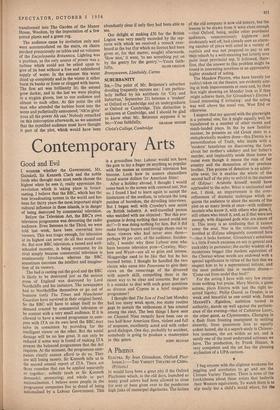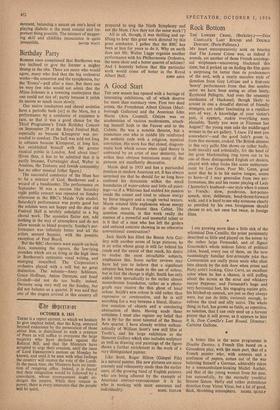A Phoenix
ELECTRA. By Jean Giraudoux. (Oxford Play- house.)—THE VARIETY THEATRE OF CHINA. (Princes.)
IT would have been a great pity if the Oxford Playhouse which, in the old days, launched so many good actors had been allowed to close for ever or been given over to the ponderous high jinks of municipal dignitaries. The failure of the old company is now old history, but the lessons to be drawn from it were clear, enough —that Oxford, being, unlike other provincial audiences, conscientiously highbrow and moderately well off, had already seen an alarm- ing number of plays well acted in a variety of capitals and was not prepared to pay to see their rehash by a well-meaning but latterly ever more inept provincial rep. It followed, there- fore, that the answer to this problem might be found in interesting novelties or an appreciably higher standard of acting.
The Meadow Players, who have bravely (or rashly) taken on the theatre, are evidently aim- ing at both improvements at once and, by their first night showing on Monday look as if they might achieve them, for Giraudoux's Electra I found interesting if irritating : and the acting was well above the usual run, West End or otherwise.
I suspect that my quarrel with the playwright is a personal one, for it might equally well be transferred to a number of other recent and much-lauded plays. In the by now familiar manner, he presents an old Greek story in a metaphorically modern dress—this Electra is a personification of Truth, who insists with a 'modern' fanaticism on discovering the facts about her mother's adultery and her father's murder, and implacably sends them home to roost even though it means the ruin of her country and the damnation of her precious brother. This process of detection is an admir- able twist, for it enables the whole of the second half of the play to unfold in the manner of CEdipus: Aristotle himself would have applauded to the echo. What is unclassical and not, I think, an improvement is the over- refinement of dramatic technique which re- quires the audience to share the secrets of the plot on so many levels at once—with ordinary mortals who know it, with others who guess it, still others who intuit it, and, as if that were not enough, with disguised gods who are aware of it. This irony is so confusing that it cannot enter the soul. Nor is the criticism usually levelled at lEdipus adequately countered here —that it lacks humour. Giraudoux's substitute is a little French excursus on sex in general and cuckoldry in particular; the earthy wisdom of a mysterious beggar (the modern equivalent of the Chorus) whose words are endowed with a special significance in virtue of the fact that we suspect him to be a supernatural initiate; and the most pathetic line in modern drama— 'Come out from under that bird !'
For the acting 1 have with very few excep- tions nothing but praise. Mary Morris, a guest actress, plays Electra with just the right in- spired bigotry: Philip Guard, as Orestes, is as weak and beautiful as one could wish. James Maxwell's iEgisthus, ambition turned to authority, stands up well against the perform- ance of the evening—that of Catherine Lacey, the other guest, as Clytemnestra. Changing in a flash from freezing resentment to melting sincerity, from passionate love to equally ardent hatred, she is a superb study in Chinese- box contrasts, the act within an act, and is surely one of the most underrated actresses we have. The production, by Frank Hauser, is very competent and the set has the pleasing stylisation of a UPA cartoon.
I beg anyone with the slightest weakness for juggling and acrobatics to go and see the Chinese Variety Theatre. There is none of the freakishness about these artists that bedevils their Western equivalents. To watch them is to slip easily ino a child's world where, for the
moment, balancing a saucer on one's head or playing diabolo is the most natural and im- portant thing possible. The mixture of stagger- ing skill and childlike insouciance is quite



















































 Previous page
Previous page